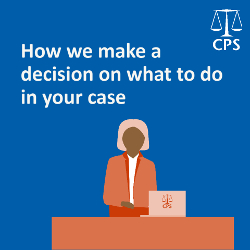If our prosecutor decides the case doesn’t pass our two-stage test, and there is no further evidence that the police could look for that would change this, they can't charge the suspect. This is also called a decision to advise ‘no further action’ (NFA).
If we decide not to prosecute the case we will explain the reasons why - usually it will be your police contact who explains this decision to you, but in some types of cases our prosecutor will send you a letter.
If you are unhappy with the decision you have the right to ask us to look at our decision again. This is called the ‘Victims’ Right to Review’.
There is no formal process that you need to follow to request a review of your case - all you need to do is let us know that you would like us to look at our decision again. You can do so easily online, or call us if you prefer.
If you’d like to you can include information about why you’d like us to review the case or why you think the decision is wrong but you don’t need to do this - it is enough just to tell us that you’d like us to review the decision.
If you’d like to request a review you should do this as soon as possible after we have let you know about our decision not to charge your case and ideally no later than 10 working days (two weeks) later. We can only accept requests made more than three months after the decision in exceptional circumstances - for example if you weren’t told at the time about your right to review.
If you request a review a new prosecutor from within the CPS Area will review all the evidence and apply our two-stage test again to come to their own decision in the case. They may decide that the legal test is met and the suspect can be charged or they may agree with the decision that there should be no further action.
Once they’ve completed this review, they will write to you to explain their decision. They will also offer to speak to you over the phone or in person to discuss the case if you would find that helpful. If you’ve provided any additional information alongside your request for a review - for example, information about why you think the decision is wrong - then the prosecutor will address any points you have raised in their explanation.
In most cases the prosecutor will tell you their decision within 30 working days (about six weeks). If the review is likely to take longer than this, for example if there is a lot of evidence to consider, then we will let you know how long the review is likely to take and keep you updated with our progress.
If you are not happy with the decision of the new prosecutor then you can request a further review of the case. This will be carried out by our Appeals and Review Unit. They will review of the evidence and apply our two-stage test to come to their own decision in the case. They’ll write to you to explain their decision.
You can find out more on our Victims’ Right to Review page.
